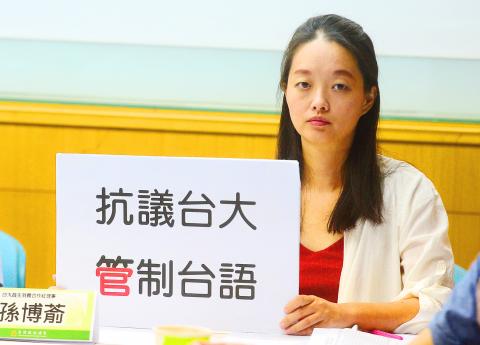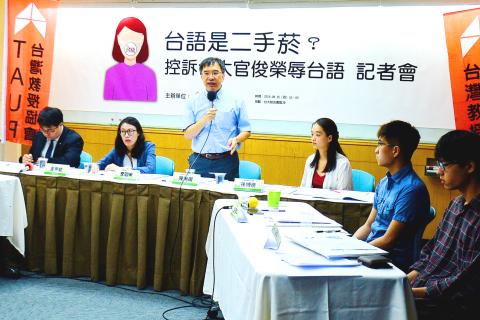Language rights advocates and academics yesterday stood up for students at National Taiwan University (NTU) who wish to speak their mother tongues, after two professors instituted a rule that school meetings must be conducted in Mandarin only.
The incident was an example of “cultural bullying,” as it prevented students from speaking in their mother tongue and had contravened the National Languages Development Act (國家語言發展法), Taiwan Association of University Professors deputy chairman Chen Li-fu (陳俐甫) said.
“It is a basic right of citizens... Yet these two professors at a leading university deprived the students of their language rights and continued the cultural oppression of Taiwanese,” Chen said.

Photo: Wang Yi-sung, Taipei Times
At a NTU Cooperative Shop board meeting on July 30, student representative Sun Phok-ju spoke in Hoklo (commonly known as Taiwanese), but was ordered to stop by chairwoman Shih Hsiu-hui (施秀惠), a biology professor, who said that agricultural economics professor Jerome Geaun (官俊榮) had proposed a motion for the meeting to be conducted in Mandarin only.
Geaun was at the June 30 meeting and justified his motion by comparing speaking Hoklo to smoking cigarettes.
“You have the liberty to smoke, but you cannot infringe on other people’s liberty,” which is why there are non-smoking areas, he said.

Photo: Wang Yi-sung, Taipei Times
Sun said that at an earlier meeting, Shih had demanded that people only use the “official language” and said that people using any other language would not be allowed to speak and would not be recorded in the meeting’s minutes.
“I talked about our rights to speak our mother tongue, and mentioned the National Languages Development Act, but it was no use. Shih would not allow us, even though we had people at the meeting who were willing to act as translators,” she said.
“Then Geaun compared people speaking Hoklo to people smoking cigarettes... He was equating speaking Hoklo to damaging other people’s health, like secondhand smoke,” Sun said. “It was a grave insult to many of us.”
Alliance to Promote Common Use of Hoklo director Khoo Hui-ing (許慧盈) said that Shih and Geaun were imposing their idea that Mandarin is a superior language to the exclusion of other languages, which would cause other languages to die out.
Attorney Huang Di-ying (黃帝穎) said that the Ministry of Education and Control Yuan should investigate the matter, as the two professors’ words and actions were discriminatory and contravened the language law.
In related news, the Ministry of Foreign Affairs announced that Taiwanese are now allowed to use the romanized spellings of their names in Hoklo, Hakka and Aboriginal languages for their passports.
It is now possible to have romanized names transliterated from one of the national languages, Bureau of Consular Affairs Director Antonio Chen (陳俊賢) told a regular news conference in Taipei.
The change comes after an amendment to Article 14 of the Enforcement Rules of the Passport Act (護照條例施行細則) was passed on Friday last week, Chen said.
Previously, only Mandarin Chinese names could be romanized.
Additional reporting by CNA

ENDEAVOR MANTA: The ship is programmed to automatically return to its designated home port and would self-destruct if seized by another party The Endeavor Manta, Taiwan’s first military-specification uncrewed surface vehicle (USV) tailor-made to operate in the Taiwan Strait in a bid to bolster the nation’s asymmetric combat capabilities made its first appearance at Kaohsiung’s Singda Harbor yesterday. Taking inspiration from Ukraine’s navy, which is using USVs to force Russia’s Black Sea fleet to take shelter within its own ports, CSBC Taiwan (台灣國際造船) established a research and development unit on USVs last year, CSBC chairman Huang Cheng-hung (黃正弘) said. With the exception of the satellite guidance system and the outboard motors — which were purchased from foreign companies that were not affiliated with Chinese-funded

PERMIT REVOKED: The influencer at a news conference said the National Immigration Agency was infringing on human rights and persecuting Chinese spouses Chinese influencer “Yaya in Taiwan” (亞亞在台灣) yesterday evening voluntarily left Taiwan, despite saying yesterday morning that she had “no intention” of leaving after her residence permit was revoked over her comments on Taiwan being “unified” with China by military force. The Ministry of the Interior yesterday had said that it could forcibly deport the influencer at midnight, but was considering taking a more flexible approach and beginning procedures this morning. The influencer, whose given name is Liu Zhenya (劉振亞), departed on a 8:45pm flight from Taipei International Airport (Songshan airport) to Fuzhou, China. Liu held a news conference at the airport at 7pm,

Taiwan was ranked the fourth-safest country in the world with a score of 82.9, trailing only Andorra, the United Arab Emirates and Qatar in Numbeo’s Safety Index by Country report. Taiwan’s score improved by 0.1 points compared with last year’s mid-year report, which had Taiwan fourth with a score of 82.8. However, both scores were lower than in last year’s first review, when Taiwan scored 83.3, and are a long way from when Taiwan was named the second-safest country in the world in 2021, scoring 84.8. Taiwan ranked higher than Singapore in ninth with a score of 77.4 and Japan in 10th with

GRIDLOCK: The National Fire Agency’s Special Search and Rescue team is on standby to travel to the countries to help out with the rescue effort A powerful earthquake rocked Myanmar and neighboring Thailand yesterday, killing at least three people in Bangkok and burying dozens when a high-rise building under construction collapsed. Footage shared on social media from Myanmar’s second-largest city showed widespread destruction, raising fears that many were trapped under the rubble or killed. The magnitude 7.7 earthquake, with an epicenter near Mandalay in Myanmar, struck at midday and was followed by a strong magnitude 6.4 aftershock. The extent of death, injury and destruction — especially in Myanmar, which is embroiled in a civil war and where information is tightly controlled at the best of times —